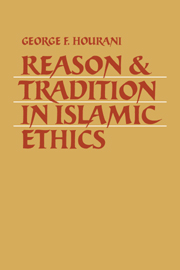Book contents
- Frontmatter
- Contents
- Preface
- Foreword by Michael Marmura
- Conventions
- Titles and locations of the original articles
- Introduction
- 1 Islamic theology and Muslim philosophy
- 2 Ethics in classical Islam: a conspectus
- 3 Ethical presuppositions of the Qurʾān
- 4 ‘Injuring oneself’ in the Qurʾān, in the light of Aristotle
- 5 Two theories of value in early Islam
- 6 Islamic and non-Islamic origin of Muʿtazilite ethical rationalism
- 7 The rationalist ethics of ʿAbd al-Jabbār
- 8 Deliberation in Aristotle and ʿAbd al-Jabbār
- 9 Ashʿarī
- 10 Juwaynī's criticisms of Muʿtazilite ethics
- 11 Ghazālī on the ethics of action
- 12 Reason and revelation in Ibn Ḥazm's ethical thought
- 13 The basis of authority of consensus in Sunnite Islam
- 14 Ibn Sīnā's ‘Essay on the secret of destiny’
- 15 Averroes on good and evil
- 16 Combinations of reason and tradition in Islamic ethics
- Select bibliography
- Index
- Frontmatter
- Contents
- Preface
- Foreword by Michael Marmura
- Conventions
- Titles and locations of the original articles
- Introduction
- 1 Islamic theology and Muslim philosophy
- 2 Ethics in classical Islam: a conspectus
- 3 Ethical presuppositions of the Qurʾān
- 4 ‘Injuring oneself’ in the Qurʾān, in the light of Aristotle
- 5 Two theories of value in early Islam
- 6 Islamic and non-Islamic origin of Muʿtazilite ethical rationalism
- 7 The rationalist ethics of ʿAbd al-Jabbār
- 8 Deliberation in Aristotle and ʿAbd al-Jabbār
- 9 Ashʿarī
- 10 Juwaynī's criticisms of Muʿtazilite ethics
- 11 Ghazālī on the ethics of action
- 12 Reason and revelation in Ibn Ḥazm's ethical thought
- 13 The basis of authority of consensus in Sunnite Islam
- 14 Ibn Sīnā's ‘Essay on the secret of destiny’
- 15 Averroes on good and evil
- 16 Combinations of reason and tradition in Islamic ethics
- Select bibliography
- Index
Summary
Al-Ashʿarī, Abu l-Ḥasan ʿAlī b. Ismāʿīl (approximately 873–935), a leading conservative theologian in Sunnite Islam, after whom an enduring school of theology is named.
Born in Baṣra, he received the usual Islamic education in the Qurʾān, Traditions, Arabic philology and sharīʿa law, then studied theology (kalām) under the foremost Muʿtazilite theologian of the Baṣra school, Jubbāʾī (d. 915). He gained a reputation as an excellent debater on theology in the mosques and wrote works in the rationalist tradition of his master, which have not survived. At the age of forty, however, he changed his doctrinal position to a more traditionalist one and became a strong opponent of the Muʿtazilites. This event is reported as resulting from three dreams, in the first two of which Muḥammad commanded him to defend a more traditional Islam, while in the third he insisted that he should not abandon the dialectical method of kalām but should use it to combat Muʿtazilite rationalism. Then for the rest of his life Ashʿarī championed traditional Islamic theology, moving at some time from Basra to Baghdād where he died. Among his few surviving works from this later period are two that present in dialectical form his doctrinal positions and arguments, the Ibāna and the Lumʿa, as well as a valuable survey of the sects of Islam, Maqālāt al-Islāmiyyīn.
The most distinctive and influential feature of Ashʿarīs new ‘conservative’ theology is its method.
- Type
- Chapter
- Information
- Reason and Tradition in Islamic Ethics , pp. 118 - 123Publisher: Cambridge University PressPrint publication year: 1985



